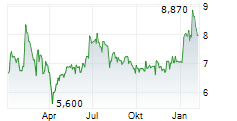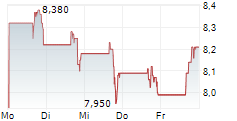REHOVOT, Israel, and HOBOKEN, N.J., Nov. 04, 2025 (GLOBE NEWSWIRE) -- Kamada Ltd. (NASDAQ: KMDA; TASE: KMDA.TA), a global biopharmaceutical company with a portfolio of marketed products indicated for rare and serious conditions and a leader in the specialty plasma-derived field, today announced that the first patient was enrolled into an investigator-initiated post-marketing clinical trial of CYTOGAM® (Cytomegalovirus Immune Globulin Intravenous [Human]) (CMV-IGIV) to prevent late Cytomegalovirus ("CMV") infection, a common post-transplant infectious complication that remains an unaddressed medical need, despite recent advances in anti-viral drug therapies.
The study, titled "Strategic Help with Immunoglobulin to Enhance protection against Late Disease (CMV)" or SHIELD, is a prospective, randomized, controlled multicenter investigator-initiated study in CMV high-risk kidney transplant recipients.
CMV disease is an opportunistic infection that can occur in transplant recipients due to the use of anti-rejection medications that weaken the immune system. Anti-rejection medication is typically most intense in the first few months after transplant. During this period, transplant recipients are prescribed prophylactic antiviral medications. The SHIELD study will investigate the benefits of CYTOGAM administered at the conclusion of the anti-viral prophylaxis to reduce the risk of clinically significant late CMV in kidney transplant recipients who are CMV seronegative and have a CMV seropositive donor. These patients are at the highest risk of developing late-onset CMV infection, which is associated with worse transplant recipient health and outcomes.
The study is being conducted by leading experts and key opinion leaders in CMV and organ transplantation, Camille Kotton, M.D., Infectious Disease Specialist and Clinical Director, Transplant and Immunocompromised Host Infectious Diseases at Massachusetts General Hospital, and David Wojciechowski D.O., Medical Director of the Kidney Transplantation Program at the University of Texas Southwestern Medical Center. Both investigators are recognized experts in transplant-related infections.
Drs. Kotton and Wojciechowski said in a joint statement: "CMV disease is a leading cause for organ dysfunction and severe transplantation complications. There is a significant need in post-operative transplant care for rigorous scientific exploration of innovative prophylactic approaches for decreasing the risk of late CMV infection and improving transplant patient outcomes. We are grateful for Kamada's support of this trial to explore the use of CYTOGAM dosed at the end of anti-viral prophylaxis therapy in patients with the highest risk of late CMV."
"Up to one third of kidney transplant patients may develop late CMV infection or disease after stopping initial anti-viral prophylaxis therapy," said Amir London, Kamada's Chief Executive Officer. "CYTOGAM is a critical life-saving therapeutic, and our support for this study further underscores Kamada's commitment to serving the transplant community. We look forward to the results of this important post-marketing trial, led by two distinguished thought leaders in Drs. Kotton and Wojciechowski."
About CYTOGAM
Cytogam is an intravenous immunoglobulin containing standardized amount of antibody to cytomegalovirus. It is indicated for the prophylaxis of cytomegalovirus disease associated with transplantation of kidney, lung, liver, pancreas and heart. In transplants of these organs other than kidney from CMV seropositive donors into seronegative recipients, prophylactic CMV-IGIV should be considered in combination with ganciclovir.
Important Safety Information for CYTOGAM:
Cytogam is contraindicated in individuals with a history of a prior severe reaction associated with the administration of this or other human immunoglobulin preparations. Persons with selective immunoglobulin A de?ciency have the potential for developing antibodies to immunoglobulin A and could have anaphylactic reactions to subsequent administration of blood products that contain immunoglobulin A, including Cytogam. Minor reactions, such as ?ushing, chills, muscle cramps, back pain, fever, nausea, vomiting, arthralgia, and wheezing, were the most frequent adverse reactions observed during the clinical trials for Cytogam.? Immune Globulin Intravenous (Human) products have been reported to be associated with renal dysfunction, acute renal failure, osmotic nephrosis, and death. Thrombotic events have been reported in association with IGIV. Cytogam is derived from human plasma. As with all plasma-derived products, the risk of transmission of infectious agents, including viruses and, theoretically, the Creutzfeldt-Jakob disease (CJD) agent, cannot be completely eliminated.
Please see full Prescribing Information for full safety prescribing details.
To report SUSPECTED ADVERSE REACTIONS, contact Kamada at pharmacovigilance@kamada.com or 1-(866)-916-0077 or FDA at 1-800-FDA-1088 or www.fda.gov/medwatch.
About Kamada
Kamada Ltd. (the "Company") is a global biopharmaceutical company with a portfolio of marketed products indicated for rare and serious conditions and a leader in the specialty plasma-derived therapies field. The Company's strategy is focused on driving profitable growth through four primary growth pillars: First, organic growth from its commercial activities, including continued investment in the commercialization and life cycle management of its proprietary products, which include six FDA-approved specialty plasma-derived products: KEDRAB®, CYTOGAM®, GLASSIA®, WINRHO SDF®, VARIZIG® and HEPAGAM B®, as well as KAMRAB®, KAMRHO (D)® and two types of equine-based anti-snake venom products, and the products in the distribution segment portfolio, mainly through the launch of several biosimilar products in Israel. Second: the Company aims to secure significant new business development, in-licensing, collaboration and/or merger and acquisition opportunities, which are anticipated to enhance the Company's marketed products portfolio and leverage its financial strength and existing commercial infrastructure to drive long-term growth. Third: the Company is expanding its plasma collection operations to support revenue growth through the sale of normal source plasma to other plasma-derived manufacturers, and to support its increasing demand for hyper-immune plasma. The Company currently owns three operating plasma collection centers in the United States, in Beaumont Texas, Houston Texas, and San Antonio, Texas. Lastly, the Company is leveraging its manufacturing, research and development expertise to advance the development and commercialization of additional product candidates, targeting areas of significant unmet medical need, with the lead product candidate Inhaled AAT, for which the Company is continuing to progress the InnovAATe clinical trial, a randomized, double-blind, placebo-controlled, pivotal Phase 3 trial. FIMI Opportunity Funds, the leading private equity firm in Israel, is the Company's controlling shareholder, beneficially owning approximately 38% of the outstanding ordinary shares.
CONTACTS:
Chaime Orlev
Chief Financial Officer
IR@kamada.com
Brian Ritchie
LifeSci Advisors, LLC
212-915-2578
britchie@LifeSciAdvisors.com




